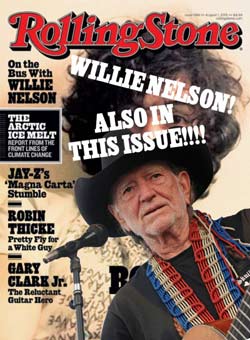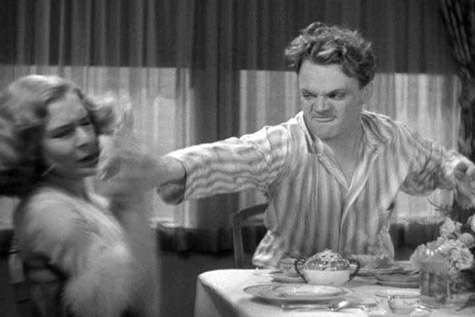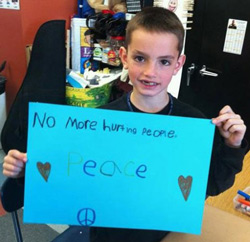
And he’s not alone.
“Bad boys, bad boys, watcha gonna do, watcha gonna do when they come for you?”
When he wrote that, Bob Marley might well have been thinking of our society’s endless fascination with, and attraction to, bad guys. We turn them into folk heroes, pop culture icons. I was already thinking about this in the wake of the tragic passing of James Gandolfini. His portrayal of Tony Soprano is one for the ages and will be with us forever. Tony will be admired, envied, looked up to and even deified, in spite of the fact that he’s a brutal, two-timing, wife-cheating thug.
Even before Rolling Stone turned Dzhokhar Tsarnaev into a rock star, he had already become a virtual (literally and figuratively) fan fave of tween girls who are no more discerning, and perhaps strangely even less so, than their adult counterparts. Our culture’s love of bad boys dates back to Jimmie Cagney movies, advancing to Humphrey Bogart and, finally, the gangster era spawned by the Coreleone family in The Godfather, perhaps the greatest film ever made.

The problem is how we extend the mythology from fiction into fact, seeing real life bad boys as saintly robin hoods or tortured souls, instead of the brutal and irredeemable punks they usually are. Such a proclivity stems first from our almost inbred nature to worship the kind of power that mobsters possess. They write their own rules, never wait in line in restaurants, never have to worry about how they’re going to pay the bills, can have the crap kicked out of anyone who crosses them. We might not want to do what they do, but we still want to be as they are. From that twisted perspective, they solve other people’s problems and never have any of their own. The Boston gangster Whitey Bulger, for example, currently on trial for no less than nineteen murders, was known for distributing free turkeys to the poor on Thanksgiving and for fighting to keep drugs out of his native South Boston. Yet neither of those was true.
So what does it say about our collective psyche that we look up to and admire men like Tony Soprano in fiction and fact? Well, basically we all need to believe in something—that we’re not powerless and that someday we’ll get the rewards we truly deserve. We emulate the qualities in mobsters we see lacking in ourselves, even though this means overlooking the bad that comes with them.
 Tween girls want to date Dzhokhar because he’s hot and somebody that cute can’t possibly be guilty of murder; they can’t get past this bad boy’s looks any more than adults can get past the ability of bad men to command respect and have their rings kissed. I don’t know what’s more chilling: that his fandom wants to save Dzhokhar or the fact that they believe he can be saved. The kid put a backpack stuffed with a bomb in front of an eight-year-old boy, remember?
Tween girls want to date Dzhokhar because he’s hot and somebody that cute can’t possibly be guilty of murder; they can’t get past this bad boy’s looks any more than adults can get past the ability of bad men to command respect and have their rings kissed. I don’t know what’s more chilling: that his fandom wants to save Dzhokhar or the fact that they believe he can be saved. The kid put a backpack stuffed with a bomb in front of an eight-year-old boy, remember?
In the same courtroom where Dzhokhar may himself appear, right now we can’t take our eyes off Whitey Bulger because he kicked the ass of anyone who opposed him even as he hoodwinked the FBI. He was lots of things, but most of all he had the kind of power all of us inwardly crave. Michael Corleone didn’t really want to become the Don, only wanted to do right for his family. Tony Soprano could strangle an informant and meet up with his daughter an hour later to finish her college tour. And you don’t want to mess with either, just like we don’t want anyone to mess with us. We want to make people offers they can’t refuse, even if that means we have to be a little bit bad too, our reasoning just as skewed as those young girls wasting printer ink on love letters to a psychopath.
Would Rolling Stone have put Dzhokhar Tsarnaev on the cover if he didn’t look like a Backstreet Boy? Of course not, because that would’ve upset the paradigm of the brooding James Dean/Marlon Brando character recast as a Shakespearean Richard III type. Dzhokhar looks like he’s ready to be saved, just like Tony Soprano always looks ready to kick somebody’s ass.
But we can do better when it comes to heroes. So can Rolling Stone.
Parody Magazine Cover via College Humor/Christian Lynch
Jon Land is the critically acclaimed author of thirty novels, including the bestselling series featuring female Texas Ranger Caitlin Strong: Strong Enough to Die, Strong Justice, Strong at the Break and Strong Vengeance. The fifth, Strong Rain Falling, will be released in August, 2013. In addition, he is the author of the nonfiction bestseller Betrayal. He lives in Providence, Rhode Island.
